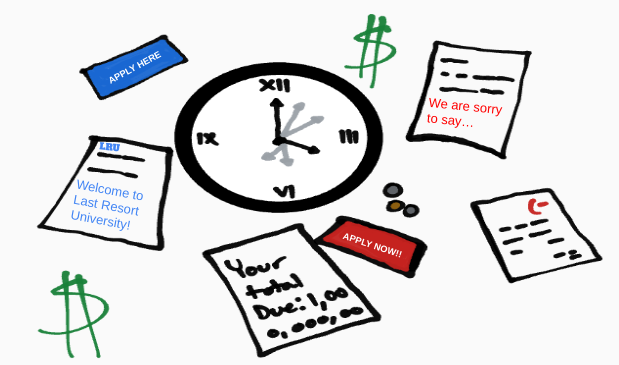The high school hustle
Students are rushed into major life decisions too quickly
April 10, 2023
Periods of transition can be some of the most transformative and emotionally fraught times of one’s life—and high schoolers face one of the biggest ones they’ll ever have to experience in their senior year. The last year of high school is filled with exhilaration for the future. Plans for the future suddenly seem so much realer and more consequential, and for those heading off to higher education, college applications loom forefront on the horizon.
But exciting as this process can be, for many the fear and anxiety outweighs the thrill. Now, decisions suddenly have lasting, life-changing implications. And students are expected to make all of them within just a couple years of their youth, which is already jam-packed with too much to do?
This is a very real problem with our educational system. Teens are rushed into major life decisions not only before they’re legal adults, but while they’re still majorly underdeveloped and unsure of themselves. While nobody is required to have a specific college major or trade in mind as they move beyond college, failing to prepare young for a life path could put some at a disadvantage, which many students decide not to risk.
Too many students try to cram a lengthy process of self-examination into just one year of high school—and along with that, students have to balance a variety of other activities and academics, which leaves little opportunity for students to try new things in order to see what sticks with them. Are teenagers expected to have been born with a marketable, developed passion?
As it is now, many people grasp at straws in their youth for potential career paths, usually along the lines of how they can use skills they already have to make money. Changing the course you’re already hurtling down can be tricky and scary, and so if people make early decisions that don’t reflect interests and passions they develop later, they could be on a fast track to feeling stuck, burned-out, and unhappy in their choices.
Part of this pressure to make early, ill-informed decisions is driven by the pressure to succeed. In our current society, there are standards, judgements, and expectations for all kinds of things.
When it comes to college, for example, not only do students develop unfounded desires to go to prestigious universities just for the names they offer, but they also face the stress of being judged in all manners of their life as a marker of their future accomplishments.
Many pad their high school experiences with an unsustainable overload of work and extracurriculars, just for the sake of having a better-looking college application. A student might feel compelled to abandon pursuing their hobbies for the sake of a leadership position in a club they don’t feel strongly about, because they’re convinced that they’re not good enough to make money off of their interests.
Instead of this, teens should be spending more time with their friends, cultivating a wide variety of interests, and opening their minds to the world around them. That’s the only way we’re going to discover what will make us happy and make us money in the future.
A few lucky students know early what they want to do, stick with it, and keep working toward it throughout high school and into college. For others, it takes longer to discover passions and career prospects, and that’s ok—it’s part of the journey to a fulfilled life. It shouldn’t be expected for young people to know what to do right off the bat, and unabashedly taking one’s time with discovering their life’s path should be considered normal instead of less than the ideal.
Schools can help by being flexible. Instead of single-mindedly encouraging academic success, they should help students develop more rounded skills and experiences, start us earlier with thinking about our futures, and make us more aware of multi-disciplinary options so fewer people end up feeling stuck and pigeon-holed.
And to students: part of it is up to you. Volunteer in new places, join clubs and programs, take a class on a subject that’s totally unfamiliar, find communities that speak to you. Try out a bunch of things without buying into the pressure to stick to any of them permanently. Who knows—maybe the world will start to seem larger, and the stresses for the future will melt away in the face of the overwhelming variety of opportunities out there.




